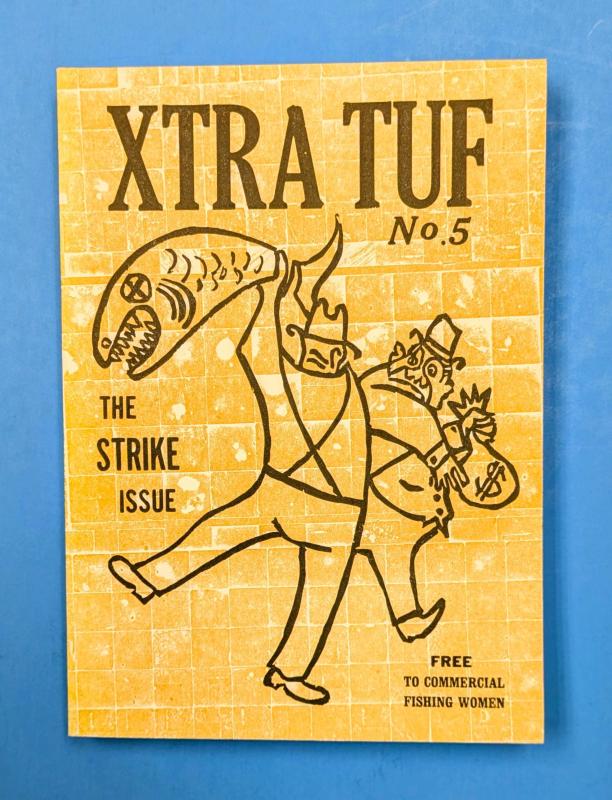
Xtra Tuf: The Strike Issue
by Moe Bowstern Author
Meet Moe Bowstern: writer, fisherwoman, and tough cookie. Moe is a woman working in the male-dominated commercial fishing industry of Alaska's Kodiak Island and the fifth issue of the Xtra Tuf zine is her story, as Moe puts it, "The stories presented in these pages are just a few views of a complicated history. I hope reading them provides some insights into the tremendous challenges facing those who reap the seas." Winner of the 2007 Lilla Jewel Award, and sporting special letter press covers featuring more than 30 different color schemes, it tells a tale of dissent and frustration. Not only the story of a people's struggle, it's a social history and love-letter to the ancient rites and rituals of sustenance fishing. In Moe's writing you smell the salt air and land breezes. You see sunsets from the deck of the boat and feel the pitching waters. And, above all, you meet--and then know--all the earnest, hilarious, conflicted, hardworking folks who populate her narrative.
You must log in to comment.
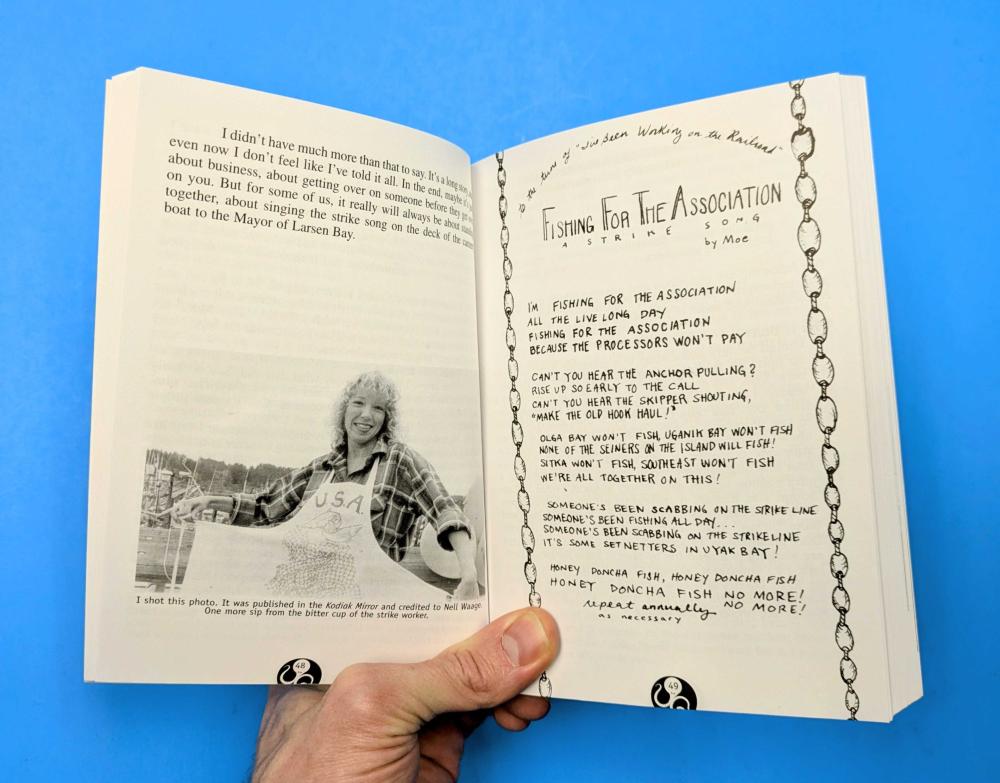
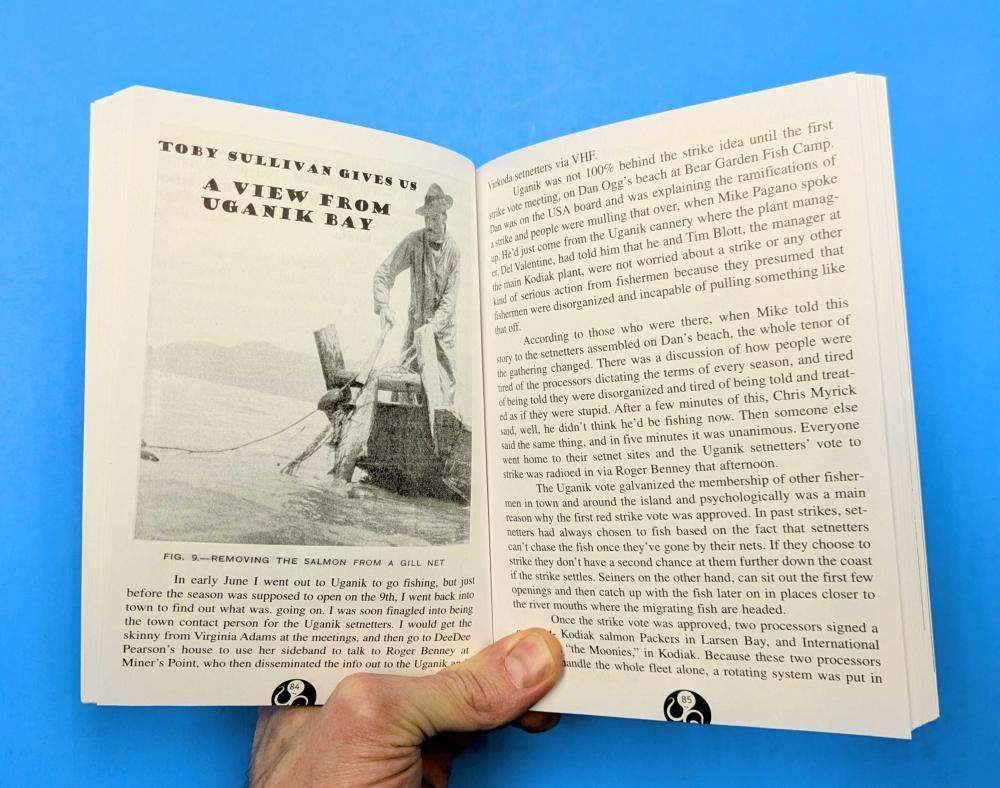
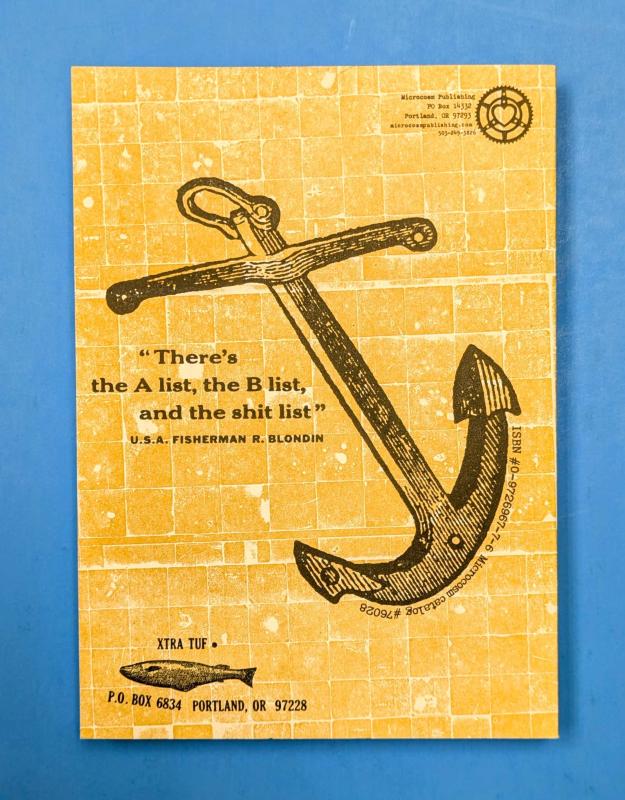
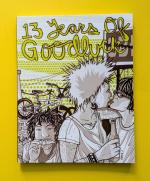
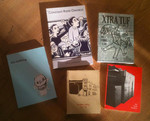
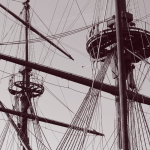

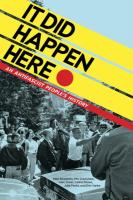




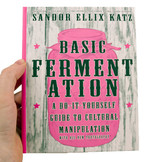

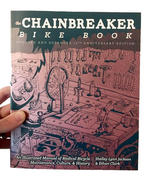
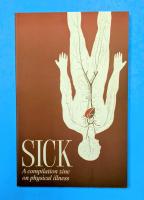

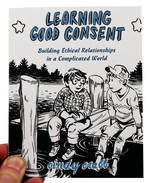
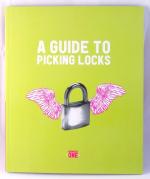
Comments & Reviews
Before 1997, at the beginning of the season, the canneries would post a price for fish, a "token cent", literally a penny per pound—and then raise it as the season progressed. The fishermen wouldn't fish without the posting. Producing fish in a competitive market, from an unpredictable sea, placed the skippers under too much financial pressure, as they hired a crew and outfitted a boat, for them not to be assured of payment. Once the token cent was posted, the skippers fished away, trusting that the canneries would eventually settle on an acceptable price, while the canneries trusted that the fishermen would bring them their fish. In 1997, everything changed. Before the Kodiak herring season, one of the big, Japanese owned canneries on cannery row did not post the usual token-cent price before the fleet went fishing. They caught and delivered fish, all on an open ticket. At the end of the season the fishermen did not get paid for their herring. The rumor was that the cannery just shrugged and said "We never said we would pay you."
[Moe] Bowstern's magnum opus. This issue includes strike-related songs, cartoons, fliers, company and union postings, and Bowstern's observations of other strike participants. The risk of bringing fish to the table becomes visceral here—and added to that is the irony that men who developed scabies and died were scabs, who, only the night before, strikers had wished dead, at least metaphorically.
In her great Xtra Tuf ‘zine series, Moe Bowstern writes about life as a commercial fisherman. She’s a solid storyteller, and puts a lot of history, life, and philosophy into her tales of hardcore fishing. You can get her new book, Xtra Tuf #5, right here, but you can also see her in action tonight at Liberty Hall (311 N Ivy) where she’s participating in the Annual Winter Solstice Puppet Show.
What does this have to do with her ‘zine writing? I’m not sure, but considering I’ve dug everything she’s done so far (she also writes the This Little Light of Mine and Second Set Out ‘zines) I’m thinking tonight should be good. The time is 9 pm. The cover is free. The audience is YOU.
This zine is such an interesting peek into the world of commercial fishing in Alaska that it’s almost possible to overlook the story’s dismissal of the gang rape incident.
Written in a style that is at once comforting and compelling, Moe Bowstern respectfully tells her story of life-as-an-Alaskan-fisherman. Xtra Tuf No. 5 takes us through the 1997 Alaskan Fisherman’s strike. It ends in 2005 with Moe coming full circle, back to her fisherman’s-soul’s life.
We’re glad she does. Moe has heart. Her allegiance to feminism is unquestionable; she talks of “dismantling the patriarchy,” she attends underground anarchist meetings and the zine itself is free to commercial fishing women. She gives nod to the linguistic debate over the term fisherman to include all, um, fisher-persons. Furthermore, she walks the walk: just how many women fishermen do you think there are, anyway?
However, there is that pesky (alleged, but you know it happened) gang rape. The victim/survivor, another female deckhand, chose not to report it—ostensibly due to her “illegal immigrant” status (she’s Australian). More likely, hers are the same reasons as any woman’s who “chooses” not to report a rape.
Nearly as horrifying as the rape itself is the reaction to it. Picnic, anyone?
Okay, so the picnic serves as a well-intentioned take action event, but make no mistake: in Alaska, during a strike, a scab is infinitely more loathed than a rapist. So much for serene sunsets and a peaceful existence. (Oh, and P.S.: vegans needn’t waste time searching for any “cruelty to fish” reference; there is none.)
Despite these subtle omissions, I still love Xtra Tuf. Read No. 5 and discover that women get hernias, hoochies aren’t just for cities anymore, and the phrase "down below" is not always accompanied with a wink and a smile. Jap-bashing, artfag deckhand and flat as piss on a plate mean anything to you? They will after you read this zine.
There is a fine line between tedious and thorough, and at times Xtra Tuf walks (or tows) that line. Cover-to-cover, it comes in at 192 pages and includes a dictionary, BBQ salmon recipe and a song about “Farmed Salmon Blues” that caps the whole thing off nicely.
Ultimately, skipping out on this zine would be unfathomable. Now put the juice to the jimmy and get reading.
Moe has a critical point of view as she writes from her position as a woman, a deckhand, a beach seiner, and an activist. At the same time, she prides herself on being fair ... Without Xtra Tuf, the history of these three labor struggles could easily be lost. Instead, we have collection of original documents and a first-hand account from a female deckhand.
Pocket-sized book issue of Moe Bowstern’s fanzine, which documents her life and times as a commercial fisher round Kodiak Bay in Alaska. I’m not sure whether all past issues of this fanzine have been issued in book format or not, but this is nicely done.
Simply put, if you work a job, you will find this of interest. “Xtra Tuf” traces the history of the labor movement at sea, the workers organizing themselves to improve their working conditions and fairer pay and the general stories and characters Moe pick ups and runs into on her journey.
Being a trade unionist myself, this cut close to the bones as time and again people are faced with having to negotiate issues that really should be any workers “right” and not a “privilege,” but you learn quickly that everything has to be fought for and nothing is granted. Thus we enter into the world of the subheading of this book – industrial action. Moe writes about what we’ve learned from past strikes, the victories as well as the defeats, the freeloaders, scabs and back stabbers out to make a quick buck off the backs of their co-workers. We’ve all been there and clearly there are strong parallels to be drawn between trade unions and punk rock – the obvious unity, quality of life over money and not putting a price on everything, the power of organizing, taking matters into your own hands to achieve better conditions, doing things on your own terms, working towards the common good and not solely what benefits the individual, etc. etc. It’s a male dominated industry as you’ve probably realized and Moe also has to battle for acceptance from her fellow trade unionists because of her sex, which is where the book’s title originates. As in most working situations, it’s a case of toughening up or else getting walked on. Fishing becomes her passion and she finds herself fighting for the rights of a community she truly believes in. Giving a good rounded view that can only come from first hand experience, Moe is realistic about her goals and has researched her demands well, knowing them to be achievable.
It’s difficult to know what era these stories come from, but cone can only assume it was around the 1980s when fishers were paid a decent wage and the value of their work was far more respected than it is now. Still, even at the time, the price paid per fish was on a steady decline, but hadn’t plummeted to the depths we see today.
The book is also laved with tons of stories from fellow fishers whom she’s crossed paths with, along with poetry, photos and sketches all related to the trade. One of the best pieces of literature I’ve read on the labor struggle in a long time. Worth seeking out, in particular for anyone who’s ever questioned the importance of union representation.
I am a sucker for pocket sized books - especially when they are filled with amazing writing. Even better if it's a book size issue of a favorite zine! Over the years I've heard many stories about working in the fishing industry in Alaska. The long hours of hard work, the crazy things things that can be pulled out of the sea, the drinking, the loads of money that could be made (years ago) and such - but no one ever spoke of the politics; the labor issues and struggles. Now, thanks to Moe, I am reading about it. This is split into sections - Win, Lose, and Draw. Moe writes a personal account of the salmon strike of the salmon strike of 1997, along with stories from other fishermen. Lose is about the United Salmon Association strike of 2002, telling the story of those who were involved. Finally, the draw section - covering the 2005 tanner crab strike. The Lose chapter is a bit thin but losing a strike is a bit depressing too. Moe talks to a lot of folks and reprints various articles. Also thrown in are some excellent drawings and art along with a great layout. There is a lot of passion and honesty pouring out of this. Moe can definitely tell a tale. Recommended.
I've got to say that I admire Moe and found myself liking her before I even got past the first couple pages. This here is more of a fat little book than a zine, and it's all about fishing strikes in Alaska. Moe is a longtime fisher and writes about her experiences with strikes in 1997, 2001, and 2002 and includes stories of strikes that go as far back as the 1930's. I've never read anything quite like this - it brings up labor issues in a totally different context then what we normally hear about. It kind of goes like this: skippers and deckhands work on fishing boats, and, along with the folks who fish from shore, and are up against the canneries, who offers up insultingly low per pound prices on salmon (or whatever else they are pulling out of the sea). Fishing folk work for themselves and are fiercely independent, making organizing, collective bargaining, and choosing to strike extra challenging. Moe's writhing is fun to read; there are good stories by other people including old timers, as well as a glossary, a short graphic story, nice bits of art and great layout.
"You can call it a zine if you want ... I say it's a book. There's a spine with print on it and everything ... There's a comic, several press releases from the USA (the United Salmon Association, of course), some song lyrics, and what have you, but most of it's good old-fashioned prose, and most of it by Moe herself. Pretty darn well-written prose, too..."
This one caught my attention with the cover illustration of a guy with a fish hitting a guy with a bag of money, and the lines "The Strike Issue," and "Free to Commercial Fishing Women." It's another one published my Microcosm Publishing and it's pretty damn cool. It covers aspects of the commercial fishing industry in the Northwest, mostly Alaska, and this issue's theme is strikes. There are stories of three strikes, told from different viewpoints (including a scab!), and with varying levels of success that make for great reading, explaining along the way some of the ins and outs of commercial fishing and dabbling in working class, lefty politics, and DIY culture. There's also a recipe, a song, etc, and the writing really does pull you in.
At first glance I wondered about the breadth of its appeal -- the 192-page zine is written by a commercial fisherwoman about her profession -- but soon found myself caught up in a fantastic net of gracefully told stories. Issue #5 is "the strike issue," featuring a range of voices from Alaskan fishermen recalling successes and failures from strikes past. There's also a surprisingly engaging history of salmon fishing on Kodiak Island and a helpful glossary with entries like "fo'c'sle" (crew's resting place) and "hoochies" (squid-like attachments for lures). I don't know if I've ever learned so much from one zine.
“The Strike Issue.” If you haven’t read Xtra Tuf, you are missing out on one of the more interesting and unique zines out there. Moe is a semi-retired commercial fisherwoman with plenty of tales still to tell about her years in the salmon fishing industry. This new paperback issue tells all about the history of strikes in the industry around the area of Kodiak Island, Alaska, which is where Moe spent most of her time working. It’s a dense issue, not always easy reading, but the content is fascinating, especially for anyone interested in labor issues (which, if you work, should mean you). Moe also does a good job of characterizing the fishing community around Kodiak, and the reader gets a clear picture of the different types of people who live around there. This is an engaging read worth seeking out.